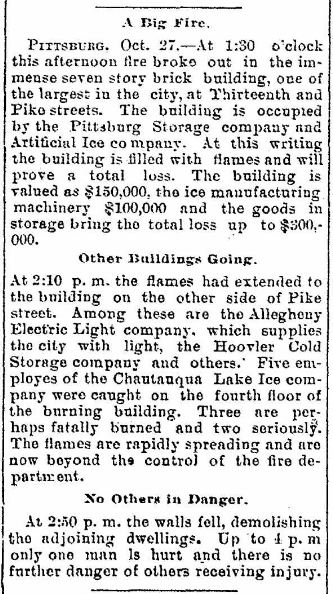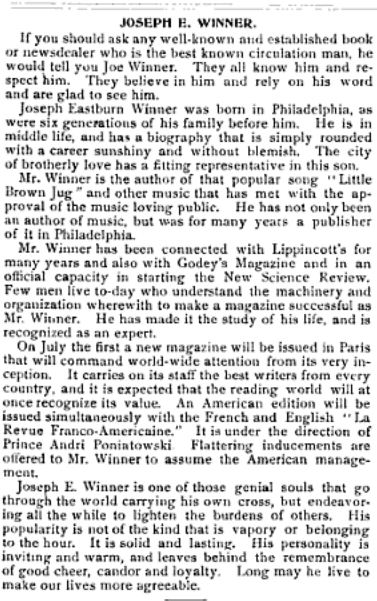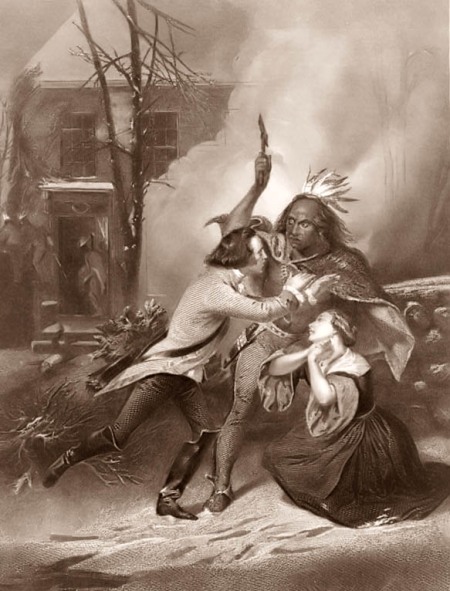
With May Day comes the annual moving proposition. It carries with it the usual annoyance of shifting your abode, for what would the first day of May come to if we didn’t continue the practice of moving? Beautiful May, all except the inconvenience of moving – a custom that won’t live down.
Portsmouth Daily Times (Portsmouth, Ohio) May 1, 1912

May Day Moving Sets New Chicago Record
(International News Service)
CHICAGO, May 24. — May Day moving here set a new record for the period of the housing shortage, according to the requests for changes to telephone and gas companies. More than 3,000 changes daily were asked of a gaslight and coke company before the yearly exodus to new homes. This is 50 per cent higher than 1921.
J.S. Waterfield, Chicago Real Estate board said the “own your own home” idea is responsible for hundreds of the movings.
New Castle News (New Castle, Pennsylvania) May 24, 1922

CHICAGO, May 1. — Thousands of families in Chicago went on a “rent strike” today and refused to vacate their apartments in accordance with May Day moving orders, H.S. Standish, president of the Chicago Tennants’ Protective League, asserted.
Mr. Standish predicted that 10,000 tenants would defy efforts of landlords to evict them.
Some of the disputes would be settled by arbitration, Mr. Standish said, but others would be carried into court for jury trials.
Battle Landlords
By JAMES HENLE,
N.E.A. Staff Correspondent.
NEW YORK, May 1. Two men are largely responsible for starting in this state the anti-rent profiteering crusade which, unless the laws are finally thrown out by the courts, has limited landlords to 25 per cent increases.
One of them is not even a New Yorker. His name is James F. Gannon, Jr., and he is city commissioner of Jersey City.
The other no longer hold any official post. His name is Nathan Hirsch and he was formerly chairman of the Mayor’s Committee on Rent Profiteering.
Victims Aided
It was Hirsch’s committee — and largely Hirsch himself — who first came to the aid of the victims or rent profiteers. Before this persons who objected to extortionate rent increases were called “Bolsheviki.” Hirsch had little real authority, but he used what he had with good effect.
The result was that any number of cases were compromised last year by the landlords, and tenants were enable to stay on by paying only moderate increases in rent. A strong public sentiment was built up to oppose rent hogs.
Hirsch was serving without pay and when the appropriation he asked to continue the committee’s work was refused he resigned.
Hug[e] Rent Strike
Then came Gannon. Early this year he engineered the biggest rent strike ever conducted and won it. Thousands of tenants with the city’s backing, refused to pay unreasonable rent increases and won in the courts.
This woke New York up. If Jersey City can do it, why can’t we? was the comment. The result was a wave of popular sentiment that swept everything before it and resulted in the enactment by the Legislature of a dozen laws to protect the tenant, the most important of which is the measure limiting rent increases to 25 per cent.
Ogden Standard Examiner (Ogden, Utah) May 1, 1920

NOTES AND GOSSIP
The month of May, when poets sing of roses and meadows decked with green, is, in the vicinity of New York, the flitting time for half the world — or has been. Fortunes are changing and even the May moving day, so long sacred to New Yorkers, is giving way before the iconoclastic spirit of the age. Enough, and more than enough of it, is left however. The removals of the great annual flitting time, often useless, often undertaken without clear reason than that restlessness so peculiar to American life, must cost the people of New York, Brooklyn and Jersey City, directly and indirectly, not less than $3,000,000 in actual money outlay, to say nothing of personal discomfort. Moving time entails an endless train f discomforts and disorders. It means a clear month’s comfort gone out of the year in preparing for the move and getting over it; is the direct cause of broken furniture not a little, of wrecked tempers by the thousands and of much actual suffering.
But moving day is not what it used to be. People who move in spring are beginning to discount it by removing at any time during the latter part of April, so that the first of May no longer resembles the fag end of a furniture dealer’s nightmare so much as it did. The real estate agents, too, have conspired against moving day. Not that the agents want people to stay where they are and forswear change. By no means. The more removals the more commissions for the agents. It is to increase their own profits and those of the owners that such strenuous efforts have been made, and with much success, to substitute October for May as the moving time. Many landlords now let houses from October to October, and more are anxious to do so. The reason is that a good many people of moderate means, whose only hope of getting wives and babies into the country for the summer is to stop paying rent, and have been in the habit of giving up their houses on May 1, storing the furniture, packing off the family and seeking board until October, when the city residence could be safely resumed in another quarter. This arrangement was fine for the tenants, but it was bad for the owners and agents, consequently it had to be stopped. And it is being stopped.
Morning Oregonian (Portland, Oregon) May 1, 1887

MAN’S INHUMANITY TO MAN. —
The following unjustifiable case of landlord oppression is one of the many cases which May day moving has developed in Jersey City: — A widow named Jane Meara, with her five children, occupied a small store in Prospect street, near Morgan. The property changed hands, and as a consequence the widow was doomed; but her lease had not expired and she held a receipt for the rent of the premises, paid in advance, for the month of May. Under these circumstances the poor woman felt secure, at least for the present; but on May day, during her absence, her furniture and goods were thrown out of doors, and when she returned to her house she found the premises so locked and fastened that ingress was impossible, while every article of her household goods was drenched with rain on the sidewalk. She at once proceeded to Justice McAnally, who very humanely allowed her the use of a house for herself and her children till she can procure other quarters, as this was the only relief he could afford in the case. The woman has commenced a suit against the new proprietor, laying damages at $10,000.
New York Herald (New York, New York) May 3, 1869

NEW – YORK CITY.
First of May — Moving Day.
There was not as much moving yesterday as is common upon the last of April — pretty good evidence that landlords generally were wise enough to fall somewhat from their old rates of rent, and so far accommodate tenants that they could afford to keep their old premises another year. Whoever is abroad to day, however, will be disposed to think there never was so much moving before. It will begin early — before some of us are up, no doubt, and it will continue late. The sidewalks will be worse obstructed in every street than Wall-street is where the Brokers are in full blast. Old beds and ricketty bedstands, handsome pianos and kitchen furniture, will be chaotically huddled together. Everything will be in a muddle. Everybody in a hurry, smashing mirrors in his haste, and carefully guarding boot boxes from harm. Sofas that go out sound will go in maimed, tables that enjoyed castors will scratch along and “tip” on one less than its complement. Bed-screws will be lost in the confusion, and many a good piece of furniture badly bruised in consequence. Family pictures will be sadly marred, and the china will be a broken set before night, in many a house. All houses will be dirty — never so dirty — into which people move, and the dirt of the old will seem enviable beside the cleanliness of the new. The old people will in their hearts murmur at these moving dispensations. the younger people, though aching in every bone, and “tired to death,” will relish the change, and think the new closets more roomy and more nice, and delight themselves fancying how this piece of furniture will look here and that piece in the other corner. The still “younger ones” will still more enjoy it. Into the cellar and upon the roof, into the rat-holes and on the yard fence, into each room and prying into every cupboard, they will make reprisals of many things “worth saving,” and mark the day white in their calendar, as little less to be longed for in the return than Fourth of July itself.
Keep your tempers, good people. Don’t growl at the carmen nor haggle over the price charged. When the scratched furniture comes in don’t believe it is utterly ruined, — a few nails, a little glue, a piece of putty, and a pint of varnish will rejuvenate many articles that will grow very old ‘twixt morning and night, and undo much of the mischief that comes of moving, and which at first sight seems irreparable.
At night, after you have kindled a fire in the grate, — don’t, because you have cleaned house, make your house a tomb for dampness, nor let the children shiver through the evening, — after the tea things have been set aside, be sure to take one peep of the moon in her eclipse. Nor stay too long to look at her, for her exhibition begins rather late, and you should be up early next day to tack down the carpets, set the furniture to rights and make a home of your new house. Moreover, if it rains or is very cloudy, take our advice and don’t look at the eclipse — it’s no great affair after all.
New York Daily Times (New York, New York) May 1, 1855

In Lighter Vein
_____
The May Queen
“You must wake and call me early,”
The prospective May Queen said.
But when called, the foxy girlie
Stayed in bed.
And her plan was far from silly
Though another served as Queen,
For the winds were raw and chilly
On the green.
To the first my hat I’m doffing,
She who dodged the breezes bleak,
For the other will be coughing
All the week.
_____
Bolting The Ticket.
“The young men have chosen her to be Queen of May.”
“And how do the other girls like that?”
“Don’t seem to like it. They’re all insurgents.”
_____
May 1 In History.
May 1, 1589 — Queen Elizabeth is Queen of May, catches cold, and has the snuffles all day.
May 1, 1755 — Moving day, Dr. Johnson evicted for non-payment of rent.
_____
“Going Maying today?”
“Nix.”
“Why not?”
“I went Maying once.”
_____
Everything Upset.
A book of verses underneath the stove,
A lump of coal upon a silver tray;
Such are the things that make a terror of
The first of May.
_____
Moving Day.
“The May migration is very ancient.”
“So?”
“Yes; Shakespeare speaks of moving accidents by flood and field.”
_____
Nothing Romantic.
“Got your wife out for a May day stroll I see. Going to hunt for arbutus?”
“Quit your kidding. We’re going to hunt for a flat.”
_____
May Moving.
“You ought to read this book. It will move you deeply.”
“Do you know any concern that will move me cheaply? That is what I’m interested in just now.”
— Washington Herald.
Evening Post (Frederick, Maryland) May 1, 1912

True Realism.
Dramatic Author — I understand that you are looking for a new play.
Manager — Yes, but I am very hard to suit. I want a play which shall combine all the elements of tragedy, comedy, farce, pantomime and spectacle.
“That’s it. That’s what I’ve got. Chock full of tragedy and human suffering, tears and smiles, joy and woe, startling surprises, unheard of mishaps, wreck and ruin, lamentations and laughter.”
“What’s the title?”
“‘A May Day Moving.'”
“What’s the plot?”
“Hasn’t any plot. Just and ordinary May day moving.”
— New York Weekly.
The Marion Star (Marion, Ohio) Nov 9, 1895

The Bradford Era (Bradford, Pennsylvania) Apr 12, 1946
I thought the May Day moving had petered out in the 1920s, but evidently it was still going strong in Pennsylvania as late as the 1940s!
Images from the Newman Library – Baruch College








































